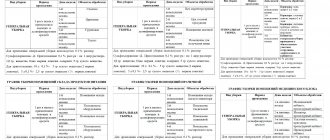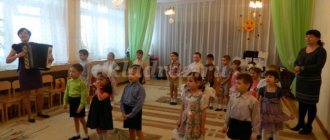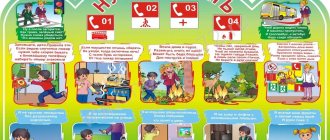Requirements for the daily routine in preschool educational institutions according to SanPiN
The standard daily routine in kindergarten is designed for 12 hours, which the child spends within the preschool walls. Any adjustments are made taking into account climatic conditions, geographical location, and other factors. The regime is drawn up in accordance with sanitary and epidemiological rules and regulations SanPiN 2.4.12660–10. Key points:
- The kindergarten provides four meals a day with a time interval of 4 hours between meals.
- There are 2 walks in the fresh air - in the morning and after a nap. In total, walking with children requires 3–4 hours. The time spent outside is reduced at temperatures below –15 °C and wind speeds of 7 m/s.
- According to the daily schedule, nap time is 2–2.5 hours, while the teacher must be present in the bedroom and monitor the sleeping children.
- It is required to ventilate the room for less than 10 minutes. every 90 minutes If there are no children, arrange ventilation 30 minutes in advance. before they arrive from the street or classes. The air temperature should not drop more than 2–4 °C; it is important to avoid drafts.
- Bed linen in kindergarten must be changed at least once a week (according to the schedule).
- In the cold season, the teacher should meet the children in the morning in the group, in warm weather - outside (at the group site).
Diet
| Time | Eating | Approximate menu |
| 8:30 | Breakfast | A hot dish (milk porridge, cottage cheese casserole, egg omelet), tea or cocoa, a sandwich with butter and cheese. |
| 10:00 | Lunch | Drink with or without fruit. |
| 12:00 | Dinner | First course (borscht, soup), second (side dish with meat or fish), salad or vegetables, cold drink. |
| 15:00 | Afternoon snack | Baking (bread), drink. |
| 18:00 | Dinner | Meat or fish dish, cottage cheese, drink. |
Kindergarten classes
In kindergarten, they develop speech skills, broaden their horizons, introduce them to the basics of mathematics and writing, instill a love of creativity and culture, and provide new knowledge. In the absence of medical contraindications, classes are conducted in the following areas:
- physical training;
- music, singing;
- art;
- mathematics;
- development of speech, logic, fine motor skills;
- preparation for school.
In kindergarten, independent games are held, when children communicate with peers, make friends, and relax. There are no more than 3 classes per day in kindergarten, with a break between them of at least 10 minutes. Lesson duration:
- junior group (children 3–4 years old) – 10 min.;
- middle group (4–5 years) – 15 minutes;
- senior group (5–6 years old) – 20 min.;
- preparatory group (6–7 years old) – 30 min.
Process nuances
Each type of activity (games, food, walks, learning) must be carried out in compliance with certain nuances. With their help, you can make your child more energetic and cheerful.
Nutrition rules
In order for a child to grow up healthy and receive all the necessary vitamins, he needs to be provided with proper and balanced nutrition. The best option would be to distribute food evenly throughout the entire waking period. Doctors recommend following the following frequency:
- Children under 3 years old. At this age, it is enough to provide four meals a day (breakfast, lunch, afternoon snack, dinner).
- From 3 to 5 years. Babies belonging to this age category are also recommended to eat 4 times a day. At the same time, light snacks (fruit, ice cream, sweets, desserts) are allowed between meals.
- From 5 years to school entry. Children at this age should be provided with five meals a day as they need more energy to learn and prepare for school.
It is equally important to choose the right products for your daily diet. All harmful ingredients that can negatively affect the functioning of the digestive system should be excluded from the general list.
Key points to consider when choosing products:
The daily diet must include the following ingredients: butter, milk, stewed or steamed meat, porridge (rice, buckwheat, oatmeal), potatoes, bread, as well as fresh vegetables and fruits. About 2 or 3 times a week you need to pamper your child with fish stews, cottage cheese, hard cheese and eggs. The preschooler's menu should constantly change
It is important that the products consumed are repeated as rarely as possible. Meat must be combined with cereals or vegetables. It is recommended to give your child a small portion of salad before meals. With the help of this dish, the secretion of gastric juice will be stimulated, which will have a positive effect on appetite. Sweet and juicy fruits are best eaten in the evening.
Sleep organization
In order for the baby to fully rest, it is necessary to provide him with appropriate conditions. The optimal duration of sleep depends on age and individual characteristics of the body. Children under 5 years old are recommended to rest at least 12 hours a day (9 hours at night and 3 during the day). Older boys and girls should sleep 1 hour less.
In order for the child to fall asleep quickly, it is recommended to avoid activities that excite the nervous system 1-2 hours before rest. These include:
- noisy games;
- sitting at a computer;
- watching TV.
Very often, preschoolers refuse to nap during the day. You can replace it with some low-active activities (reading, passive games, lying on the bed). Lack of sleep leads to poor mood, health, and learning ability.
Walking and physical activity
To improve health, it is necessary to include regular walks in the fresh air and outdoor games in a preschooler’s daily routine. Doctors recommend walking regularly, except on rainy and very cold days.
Daily walks will help improve:
- metabolic rate;
- functioning of the cardiovascular system;
- resistance to various diseases;
- state of the respiratory system.
A combination of fresh air and physical activity will be beneficial for your baby. It is allowed to perform any actions that will help strengthen health and immunity. It's best to do:
- running warm-up;
- sports games (football, basketball, badminton);
- exercises aimed at strengthening the muscular system (pull-ups on the horizontal bar, push-ups);
- entertaining games.
Daily routine in kindergarten
The daily routine in kindergarten depends on the age of the child, the specialization of the preschool educational institution, and other factors at the discretion of the teacher (methodologist, management). Activities that require increased mental stress for children are carried out in the first half of the day, alternating with physical education, music, and fine arts. This is important in order not to overload the child, to make him a comprehensively developed personality to the delight of dad and mom.
Nursery group (2–3 years)
It is important to follow the daily routine in kindergarten from the nursery on. This is necessary so that the kids adapt faster. It is important to speed up the process of getting used to the teachers and nanny so that the child does not worry and goes to kindergarten with joy every morning. Approximate daily schedule:
| Time | Daily regime |
| 7:00–8:00 | Reception of babies |
| 8:00–8:20 | Breakfast |
| 8:20–9:00 | Independent games in a group |
| 9:00–9:30 | Preparing for the walk |
| 9:30–11:30 | Street games |
| 11:30–11:45 | Return to the group, preparation for lunch |
| 11:45–12:15 | Dinner |
| 12:15–12:30 | Preparation for sleep |
| 12:30–15:00 | Quiet hour |
| 15:00–15:15 | Waking up after a nap |
| 15:15–15:30 | Afternoon snack |
| 15:30–15:45 | Stand alone games |
| 15:45–16:15 | Group classes |
| 16:15–16:30 | Preparing to go outside |
| 16:30–18:00 | Walk |
Junior group (3–4 years old)
| Time | Daily regime |
| 7:00–8:20 | Reception of children, morning exercises, games |
| 8:20–8:50 | Preparing for breakfast, eating |
| 8:50–9:20 | Games, preparation for classes |
| 9:20–10:00 | Classes |
| 10:00–10:20 | Preparing for the walk |
| 10:20–12:20 | Outdoor recreation |
| 12:20–13:00 | Dinner |
| 13:00–15:15 | Quiet hour |
| 15:15–15:45 | Awakening, games, air procedures |
| 15:45–16:00 | Afternoon snack |
| 16:00–16:30 | Games, physical activity |
| 16:30–16:50 | Gathering outside |
| 17:00–18:00 | Walk |
Middle group (4–5 years old)
| Time | Daily regime |
| 7:00–8:20 | Reception of pupils, gymnastics, outdoor games |
| 8:20–8:50 | Preparing for breakfast, eating |
| 8:50–9:50 | Preparation for classes, classes |
| 9:50–11:50 | Gathering outside for a walk |
| 11:50–12:15 | Return to the group, preparation for lunch |
| 12:15–12:50 | Dinner |
| 12:50–13:00 | Preparing for sleep |
| 13:00–15:00 | Quiet hour |
| 15:00–15:25 | Awakening, games, air procedures |
| 15:25–15:50 | Afternoon snack |
| 15:50–16:30 | Games, physical activity, music lessons, educational program |
| 16:30–18:00 | Gathering outside for a walk |
Senior (5–6 years old)
| Time | Daily regime |
| 7:00–8:30 | Reception of pupils, duty, gymnastics, outdoor games |
| 8:30–8:55 | Preparing for breakfast, eating |
| 8:55–10:50 | Developmental activities |
| 10:50–12:25 | Preparing for a walk, walk |
| 12:25–12:40 | Returning from the street, preparing for lunch |
| 12:40–13:15 | Dinner |
| 13:15–15:00 | Getting ready for bed, quiet time |
| 15:00–15:25 | Waking up, personal hygiene procedures |
| 15:25–15:40 | Afternoon snack |
| 15:40–16:20 | Games, physical education, labor, fine arts |
| 16:30–18:00 | Outdoor recreation |
Preparatory group (6–7 years old)
| Time | Daily regime |
| 7:00–8:30 | Reception of pupils, duty, gymnastics, outdoor games |
| 8:30–8:50 | Preparing for breakfast, eating |
| 8:50–9:00 | Getting ready for classes |
| 9:00–11:05 | Preparing a preschooler for school |
| 11:05–12:35 | Gathering for a walk, walk |
| 12:35–12:45 | Return to the group |
| 12:45–13:15 | Dinner |
| 13:15–15:00 | Quiet hour |
| 15:00–15:25 | Waking up, maintaining personal hygiene |
| 15:25–15:40 | Afternoon snack |
| 15:40–16:30 | Games, work, fine arts, communication with peers, gathering outside |
| 16:30–18:00 | Outdoor recreation |











